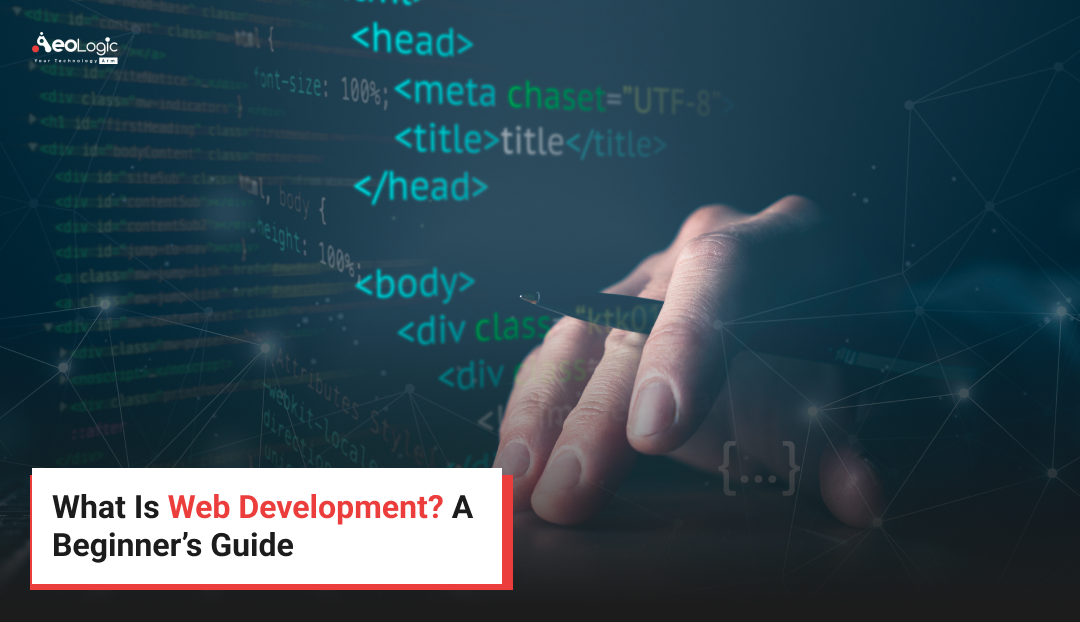When we go on the internet every day, we click on websites for everything. To read news, order food, watch videos, check social media, and even pay bills. But have you ever stopped for a second and thought about who makes these websites? Or how they are made? and what is Web Development? That whole thing, how a website is built and made to work, that’s called web development.
Now, honestly, when I first heard this word, I thought web development just meant designing some pages and adding pictures. But it’s way more than that. It’s about making the full thing work, from how it looks to how fast it opens, to how it reacts when you click a button.
In very simple words, web development means building websites that people use on the internet. It includes both the design part that we see and the coding part that works in the background. It’s like building a shop you design how it looks from the outside, but you also make sure the lights, shelves, and counter inside work properly.
A lot of people think web development is only for big companies or expert coders. That’s not true. Even small shops, freelancers, and new startups need websites today. That’s why web developers are needed everywhere.
How It Works in Simple Words
When a website is made, it doesn’t just appear suddenly. There are many steps. Let me explain in plain English.
First, someone comes up with an idea. Like, “I want a website where people can order flowers online.” That’s the start. Then, they plan what pages are needed — like Home, Products, Contact, and Cart.
After that comes design. Designers decide how the site should look — colors, buttons, images, and text style. Then, the front-end developer takes those designs and turns them into real pages using coding.
While all that’s happening, a back-end developer works behind the scenes to make sure when someone clicks “Buy Now,” the item goes into the cart and payment works.
After both sides are done, they test everything. If all works fine, the site goes live and people can use it.
And that’s the simple version of how web development works.
Why Web Development Is Important
You might think, “Okay fine, websites exist. But why is web development so important?”
Well, without web developers, the internet would be empty. No Facebook, no YouTube, no Netflix — nothing.
Here’s why it matters:
-
Every business needs a website today. It’s like having an online address.
-
Websites help people find information easily.
-
It creates jobs for millions of people.
-
It helps people connect from anywhere in the world.
-
It’s one of the easiest ways for anyone to start a business from home.
In short, without web development, there’s no modern internet.
Types of Web Development
There are mainly three types of web development.
Front-End Development
This is the part you actually see when you open a website. The colors, buttons, images, text, and layout — all that is front-end.
Front-end developers make websites look nice and easy to use.
They use some main languages like:
-
HTML (this gives structure, like the skeleton of a website)
-
CSS (this adds color, style, and layout)
-
JavaScript (this makes things move or react, like buttons or pop-ups)
So basically, the front end is what users look at. If you open YouTube or Amazon, everything you click or scroll through — that’s front-end development.
Back-End Development
Now, back-end is the opposite. You don’t see it, but it’s what makes everything work behind the screen.
Let’s say you fill out a form on a website — when you hit “Submit,” the data goes somewhere, right? That’s handled by the back end.
Back-end developers take care of data, servers, and logic. They use languages like PHP, Python, Java, or Node.js.
So, if front-end is like the face, then back-end is like the brain. It makes sure everything runs properly.
Full-Stack Development
This one’s kind of both front-end and back-end together.
A full-stack developer knows how to make a website look good and how to make it work.
So, they can build a full website from start to finish alone.
Many small businesses hire full-stack developers because it’s cheaper than hiring two people.
Other Types (Kind of Special Ones)
There are also some other areas like:
-
Web Design – that’s all about looks and layouts.
-
Web Security – keeping sites safe from hackers.
-
DevOps – managing how websites are deployed and updated.
But mostly, when people say web development, they’re talking about front end and back end.
Common Tools and Languages Used
When I first tried web development, I saw there were so many tools and languages that it almost made me give up. But later, I found out you don’t need to learn them all at once. Developers use them based on what kind of site they are making.
Here’s a simple idea:
Front-End Tools
-
HTML for structure
-
CSS for styling
-
JavaScript for adding motion and actions
Sometimes developers use frameworks like React, Angular, or Vue.js to make their work faster.
Back-End Tools
-
PHP, Python, Ruby, or Node.js for server work
-
MySQL or MongoDB for databases (that’s where all info is stored)
Other Helpful Tools
-
GitHub for saving code online
-
VS Code or Sublime Text for writing code
-
WordPress or Wix if you don’t want to code much
Examples of Web Development in Real Life
Let’s look at how websites work in real life.
E-commerce Websites (Like Amazon, Flipkart)
When you visit Amazon, you see products, search bars, and categories — that’s front end. When you log in or pay, that’s back end.
Social Media Sites (Like Facebook, Instagram)
All the likes, comments, and notifications you get — that’s web development. These websites handle millions of users using both front and back end together.
News Websites (Like BBC or Times of India)
They show updated news articles every few minutes — web developers make that possible.
Learning Websites (Like Udemy or Coursera)
They allow users to sign in, take courses, and track progress. Everything is managed through a website’s back-end system.
What Web Developers Actually Do
Many people think web developers just type random code all day. But there’s more to it. Here’s what they actually do:
-
They plan how the website will work.
-
Write the code for the front end and back end.
-
Test the site to make sure it works on all devices.
-
Fix bugs and problems when something breaks.
-
Keep improving the website after launch.
It’s like a never-ending process. The internet keeps changing, and so do websites.
Benefits of Web Development
Web development is useful for almost everyone — businesses, students, or even normal people who just want to show their work online. I’ll tell you some of the main benefits below, but not in any fancy way, just how I see it.
It Helps Businesses Grow
Every small or big company needs a website now. If a business doesn’t exist online, people usually don’t trust it much. A website makes it look real and professional.
For example, if you search for a shop and can’t find it on Google, you’ll probably skip it. That’s how important web development is for business.
It Creates Jobs
There’s a lot of demand for web developers everywhere. Companies, startups, and even freelancers are earning well by building websites. It’s one of the easiest tech skills to start learning and make money from.
You Can Work from Anywhere
Web developers don’t really need to sit in an office all the time. You just need a laptop and internet. You can work from home, from a cafe, or even while traveling. That’s one of the best parts about it.
It’s Creative and Fun
Web development is not just typing code all day. You actually get to create something that others can see and use. Like, if you make a website and your friends open it, it feels good. It’s like you built something real.
Gives Freedom
Once you learn how to build websites, you don’t need to depend on anyone to make your ideas real. You can create your own blog, online shop, or portfolio easily.
24/7 Presence
A website is always online. Even when you’re sleeping, people can still visit and learn about you or your business. That’s something no physical store can do.
Cheaper Marketing
Instead of spending money on posters or newspaper ads, businesses can just promote their websites online. It’s cheaper and reaches more people.
Challenges in Web Development
Now, I won’t lie. Web development also has its own problems. It’s not all easy. Sometimes things don’t work as expected, and that can be really frustrating.
Too Many Things to Learn
When you start, you’ll see there are too many languages and tools — HTML, CSS, JavaScript, React, PHP, Python, and many more. It feels like a mess at first.
Keeping Up with Updates
Technology changes super fast. What’s trending today becomes outdated next year. Developers have to keep learning all the time to stay updated.
Fixing Bugs
Sometimes, one small error can break the whole website. And finding that one small mistake can take hours. It can really test your patience.
Design vs Function
Developers and designers don’t always agree. Designers want things to look nice, developers want them to load fast. So, there’s always some balancing work between both.
Security
Hackers keep trying to break into websites. Developers have to make sure websites are safe and private, especially when they deal with payments or user data.
Different Devices and Browsers
A website might look perfect on one phone but broken on another. Developers have to test on many screens and browsers, which can be annoying sometimes.
Industries That Depend on Web Development
Websites are not just for tech people. Every industry now depends on them in one way or another. Here are a few simple examples.
Education
Schools, colleges, and online learning platforms all use websites now. Students can attend classes, take exams, and check results online.
E-Commerce
This one is obvious. Websites like Amazon, Flipkart, and Myntra let people shop from home. Without web development, none of that would exist.
Healthcare
Hospitals and clinics have websites for booking appointments and checking reports. There are also health blogs and fitness sites that help people daily.
Banking and Finance
You can now pay bills, transfer money, and even apply for loans online — all because of secure web platforms.
Government
Most government services have moved online. Websites are used for things like ID cards, tax filing, and public information.
Travel and Hotels
Booking a flight, hotel, or train is now possible through websites. People plan whole trips online.
Media and News
Newspapers are almost replaced by online news portals. People now read everything from websites and apps.
Entertainment
Websites like YouTube, Netflix, and music streaming sites all depend completely on web development to run smoothly.
Real Estate
Property sites let people search for houses, compare prices, and even take virtual tours online.
So yeah, almost every part of life now connects to web development in some way. It’s one of those skills that’s never going to fade away.
The Future of Web Development
I’m not an expert, but from what I see and read online, web development will keep changing fast. Websites today are not just pages with text — they are turning into smart systems that think and react.
Let me share a few things that seem to be coming next.
Websites That Feel Like Apps
You know how some websites open and work like real apps? That’s going to be the future. People don’t like downloading too many apps, so companies make websites that act like apps instead — fast, smooth, and easy to use.
More Mobile-Friendly Designs
Almost everyone uses the internet on their phone now. So developers will build websites that look and work perfectly on small screens first.
Better Speed and Simpler Designs
No one likes waiting for a page to load. Future websites will be lighter, faster, and cleaner — fewer ads, fewer distractions.
Voice Search and Smart Assistants
Websites will soon let you search or control them using voice. Like how we talk to Alexa or Google Assistant.
More Focus on Security
People share a lot of private data online. Developers will spend more time protecting websites from hacking and fraud.
Use of AI and Automation
Some websites will use smart features that learn what you like and show content based on that. It’s already happening slowly, but it’ll grow more.
People Without Coding Skills Making Sites
There are now easy tools like Wix, WordPress, and Squarespace that let normal people make websites by just dragging things around. This means more people can make their own websites without learning coding deeply.
So yeah, the future looks very active. There’s a lot to learn, but also a lot of chances for those who want to build a career in it.
Conclusion
So that’s what web development really is. It’s not just about writing code — it’s about building something people can actually use. Every time you open a website to shop, read, or learn, remember that someone worked hard behind the scenes to make it run smoothly.
Web development connects creativity and logic. It’s for people who like making things, solving problems, and learning new stuff. You don’t need to be a genius to start. You can begin small — build a simple webpage, learn from mistakes, and slowly get better.
If you think about it, everything around us online — from blogs to businesses — depends on web development. The internet is like one big city, and developers are the builders.
So if you’ve ever thought about learning it, now is the right time. It’s not too hard, and once you get the hang of it, it can even be fun.
Partner with a trusted web development company in Noida delivering modern, scalable, high-performance, and secure web solutions tailored to meet your business goals and customer expectations.
Frequently Asked Questions (FAQs)
1. What is web development in easy words?
It means making websites that people use on the internet. Some people design how it looks, and some make it work properly.
2. Is web development hard to learn?
It looks tough at first, but once you understand the basics like HTML, CSS, and JavaScript, it becomes easier with practice.
3. What are the main types of web development?
Front-end (the part users see), Back-end (the part that works in the background), and Full-stack (both together).
4. Can anyone learn web development?
Yes, anyone can learn it. There are free tutorials and videos online. You just need time and patience.
5. Do I need a degree for it?
Not really. Many web developers are self-taught. What matters is practice and building real projects.
6. How long does it take to make a website?
A simple one can be made in a few days, but a big one with many features can take months.
7. Is web development a good career?
Yes, it’s one of the most useful and flexible careers today. Every company, small or big, needs developers.
8. Can I make a website without coding?
Yes, you can use builders like WordPress or Wix. But if you want more control, it’s better to learn basic coding.

Passionate about breaking down complex tech into simple ideas. Covers everything from AI and software development to gadgets and emerging tech trends.






